Allen Park Sleep Apnea Therapy
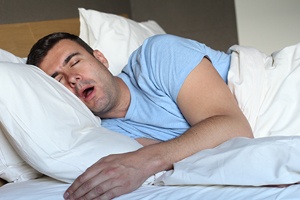 For most people, a good night’s sleep is simple. Curl up in your cozy bed, close your eyes, and wake feeling rested. Unfortunately, not everyone is lucky enough to receive the rest they need even if they remain in bed for eight or more hours each night. Those who suffer from sleep apnea wake feeling exhausted no matter how long they remain asleep. If you’re struggling with snoring, excessive daytime exhaustion, or other warning signs of sleep apnea, it’s time to contact skilled Allen Park sleep dentist, Frank Stankiewicz, DDS. That’s right, dentists are not necessarily the first medical practitioners patients consider visiting for sleep apnea therapy, but for those suffering from obstructive sleep apnea or snoring without apnea, a trip to the dentist may be just what you need. If you want to learn more about how Dr. Stankiewicz and his Allen Park dentistry team can help you with sleep apnea, please don’t hesitate to reach out to schedule a sleep apnea consultation with us today.
For most people, a good night’s sleep is simple. Curl up in your cozy bed, close your eyes, and wake feeling rested. Unfortunately, not everyone is lucky enough to receive the rest they need even if they remain in bed for eight or more hours each night. Those who suffer from sleep apnea wake feeling exhausted no matter how long they remain asleep. If you’re struggling with snoring, excessive daytime exhaustion, or other warning signs of sleep apnea, it’s time to contact skilled Allen Park sleep dentist, Frank Stankiewicz, DDS. That’s right, dentists are not necessarily the first medical practitioners patients consider visiting for sleep apnea therapy, but for those suffering from obstructive sleep apnea or snoring without apnea, a trip to the dentist may be just what you need. If you want to learn more about how Dr. Stankiewicz and his Allen Park dentistry team can help you with sleep apnea, please don’t hesitate to reach out to schedule a sleep apnea consultation with us today.
What is Sleep Apnea?
 Sleep apnea is a disorder that causes patients to cease breathing for ten or more seconds at a time during sleep. Most people will experience a few apnea events at night, but those diagnosed with sleep apnea can have 100s or 1000s of these breathing cessation events a night. There are two forms of this disorder. The first, central sleep apnea is rare. It occurs when the brain fails to trigger the body to inhale during sleep. This form of sleep apnea needs to be treated by a medical professional or neurologist in some cases, and our team will not likely be able to provide the treatment you need to improve central sleep apnea. However, we can work with you to find specialists who offer the treatments you need. The more common form of the disorder is obstructive sleep apnea. As the name suggests, it occurs when the airway is physically obstructed. This is the form of sleep apnea that we provide treatments for in our office.
Sleep apnea is a disorder that causes patients to cease breathing for ten or more seconds at a time during sleep. Most people will experience a few apnea events at night, but those diagnosed with sleep apnea can have 100s or 1000s of these breathing cessation events a night. There are two forms of this disorder. The first, central sleep apnea is rare. It occurs when the brain fails to trigger the body to inhale during sleep. This form of sleep apnea needs to be treated by a medical professional or neurologist in some cases, and our team will not likely be able to provide the treatment you need to improve central sleep apnea. However, we can work with you to find specialists who offer the treatments you need. The more common form of the disorder is obstructive sleep apnea. As the name suggests, it occurs when the airway is physically obstructed. This is the form of sleep apnea that we provide treatments for in our office.
Who is at Risk for Sleep Apnea?
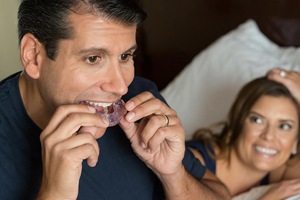 Any patient can experience sleep apnea at any age. However, the following patients are at higher risk for sleep apnea:
Any patient can experience sleep apnea at any age. However, the following patients are at higher risk for sleep apnea:
- Those over the age of 50
- Males
- Patients with a neck circumference greater than 16 inches
- Patients considered medically obese
How Will I Know I Have Sleep Apnea?
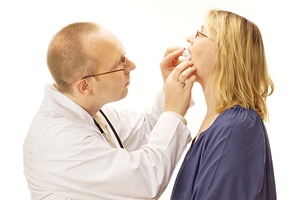 You will need to undergo a sleep study to determine with certainty whether or not you have this disorder. However, you should let our team or a trusted sleep dentist know if you have experienced any of the following warning signs, especially if you’re an at-risk patient:
You will need to undergo a sleep study to determine with certainty whether or not you have this disorder. However, you should let our team or a trusted sleep dentist know if you have experienced any of the following warning signs, especially if you’re an at-risk patient:
- Loud, chronic snoring
- Waking gasping or wheezing
- Severe daytime sleepiness
- Difficulty concentrating
- Unexplained mood or behavior
How is Sleep Apnea Treated?
Traditionally, patients receive continuous positive airway pressure (CPAP) treatment for sleep apnea, but a large percentage of patients find themselves to be CPAP intolerant. For this reason, a trip to our office may be a better option. Dr. Stankiewicz creates custom crafted oral appliances that keep the airway clear allowing patients to sleep soundly. These appliances shift the jaw forward and place pressure on the throat muscles that keep the airway clear throughout the night. The custom crafted appliances are effective in treating obstructive sleep apnea and helping patients who suffer from chronic snoring without a sleep apnea diagnosis.
Why Am I Snoring?
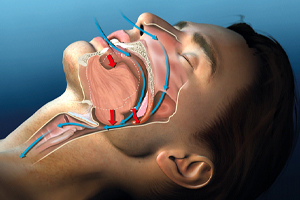
Everyone snores occasionally. The hoarse or harsh noise occurs as air flows past the relaxed soft tissues in your throat. This results in vibration when you breathe. There are several reasons this may occur. Often, snoring is not too concerning; however, if your snore chronically, it could indicate a larger underlying problem. Loud, chronic snoring is a common symptom of obstructive sleep apnea, which causes pauses in your breathing. If snoring has become a problem, it is not a sign you should ignore. Instead, it is best to be evaluated for sleep apnea right away.
Learn More About The Causes of Snoring
Sleep Testing
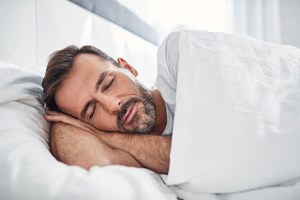
To confirm whether you have sleep apnea or a similar disorder, we’ll need to perform some tests. This can sometimes mean going to a sleep laboratory, but if you have trouble falling asleep in an unfamiliar environment, we might also be able to offer a wearable device that can monitor you while you’re at home. We can measure your snoring, body position and oxygen levels; this data will help us make a diagnosis so we can start planning your treatment.








